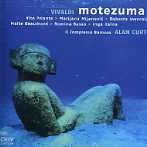The incomplete manuscript of this opera was discovered in Berlin only in 2002; much of the first and third acts are missing. Only 17 of the 28 numbers in an extant libretto are in the manuscript. Vivaldi scholar and violinist (in Alan Curtis’ Complesso Barocco) Alessandro Ciccolini undertook the task of composing the missing recitatives, completing partial arias, and re-working the arias chosen from other Vivaldi operas that now make up this “pasticcio”. For the life of me, I was not able to tell where Ciccolini’s work took over from Vivaldi’s, and the recits are just as good or bad as they are in other Vivaldi operas. Some go on far too long, but plots will be plots and I recommend using your fast-forward control after an initial run-through. The accompanying booklet outlines what is original, what has been fixed or added to, and what is taken from another opera.
The plot concerns the conquest of Mexico and its emperor Motezuma (we know him better with an “n” after the “o”) by the Spaniard Hernan Cortes, here called Fernando. They are both angry and arrogant leaders and have plenty of opportunities to express same. Complications arise with the fact the Motezuma’s daughter, Teutile, is in love with Fernando’s brother, Ramiro. There is the required happy ending.
But the plot’s not the thing, and frankly, now that we are familiar with many operas by both Handel and Vivaldi, it’s clear that the former was far more interested in psychological probing than the latter. In Handel’s poorly plotted operas we get arias that ravish the heart; in Vivaldi’s this happens far less often. But in both we get grand music and plenty of time for vocal display.
For the most part, the performance is stunning. Vivaldi augments the usual strings and winds with horns and trumpets, and Curtis leads a rich reading, filled with more drama than he normally ekes out of both players and singers (his Rodelinda lacked drama). Vito Priante is a Motezuma worth fearing, his big bass tone fully able to get around coloratura–and his angry exclamations demand the attention. As his wife, Mitrena, mezzo Marijana Mijanovic is her usual involved self, but she has some pitch and technical issues, particularly in the first act, that mar her performance.
Roberta Invernizzi sings Teutile, their daughter, with grace and feeling, and much the same may be said of mezzo Romina Basso as her lover, Ramiro. A small role, that of Asprano, a Mexican general, is taken by Inga Kalna, who is as spectacular here as she was in René Jacobs’ recording of Rinaldo. The most glorious singing/acting, however, is by yet another mezzo (all of their voices are distinguishable from one-another, happily), Maite Beaumont, who delivers Fernando’s music with spitfire diction and accuracy, portraying this tough character vividly. In short, only half of this opera may be by Vivaldi, but all of it is a joy to listen to. [7/5/2006]
































